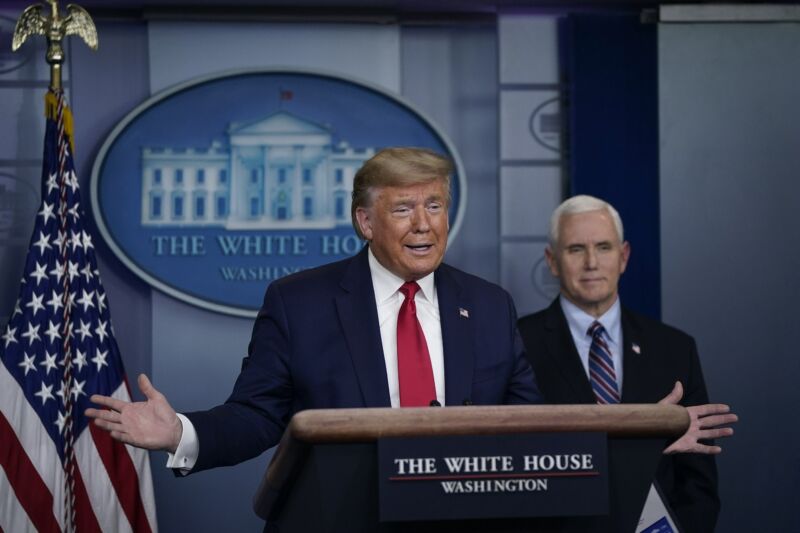Trump orders GM to make ventilators, claims company is “wasting time”

President Donald Trump today ordered General Motors to make ventilators to treat COVID-19 patients and accused the company of “wasting time.” Trump announced that he “signed a Presidential Memorandum directing the Secretary of Health and Human Services to use any and all authority available under the Defense Production Act to require General Motors to accept, perform, and prioritize Federal contracts for ventilators.”
Hours before Trump took this step, GM said it is working with ventilator-maker Ventec Life Systems “to deliver the first ventilators next month and ramp up to a manufacturing capacity of more than 10,000 critical care ventilators per month with the infrastructure and capability to scale further.”
Trump’s statement did not specify how many ventilators GM should build, but he said that GM is moving too slowly:
Our negotiations with GM regarding its ability to supply ventilators have been productive, but our fight against the virus is too urgent to allow the give-and-take of the contracting process to continue to run its normal course. GM was wasting time. Today’s action will help ensure the quick production of ventilators that will save American lives.
Trump just yesterday was downplaying the need for ventilators, telling Fox News’ Sean Hannity, “I don’t believe you need 40,000 or 30,000 ventilators. You go into major hospitals sometimes, and they’ll have two ventilators. And now, all of a sudden, they’re saying, ‘Can we order 30,000 ventilators?'”
New York Governor Andrew Cuomo called Trump’s statement “ignorant.”
“So the point is, ‘well they’re in a stockpile, you must not need them’ is just ignorant—of course you don’t need them today,” Cuomo told CNN. “You need them when you hit the apex, which is 30,000. We’re not there yet.”
White House objected to $1 billion cost
The White House this week had been preparing to announce a GM/Ventec joint venture “that would allow for the production of as many as 80,000 desperately needed ventilators,” but the Trump administration had “second thoughts” because of the cost, The New York Times reported. The Times wrote:
The decision to cancel the announcement, government officials say, came after the Federal Emergency Management Agency said it needed more time to assess whether the estimated cost was prohibitive. That price tag was more than $1 billion, with several hundred million dollars to be paid upfront to General Motors to retool a car parts plant in Kokomo, Ind., where the ventilators would be made with Ventec’s technology.
Earlier today, Trump used his Twitter account to accuse GM of demanding too much money for ventilators, saying the company “want[s] top dollar.” He also told GM to “START MAKING VENTILATORS, NOW!!!!!!”
We asked GM how many ventilators it will make as a result of Trump’s order today but did not get an answer. GM instead provided us with a general statement about its partnership with Ventec, saying the companies “have been working around the clock for weeks to meet this urgent need,” and that GM’s “commitment to build Ventec’s high-quality critical care ventilator, VOCSN, has never wavered.”
“We are focused on executing our plan,” GM said.
Both GM and Ford were already starting to make ventilators. Trump hadn’t previously used the Defense Production Act to made demands of GM, but the Food and Drug Administration issued new guidance on Sunday that loosens the agency’s strict oversight of ventilator technology, making it easier to quickly build ventilators for the coronavirus pandemic.
The US on Thursday surpassed China as the country with the largest number of confirmed coronavirus cases. The Trump administration has, as we wrote yesterday, sent conflicting signals about the seriousness the pandemic and taken too long to implement a coherent plan for fighting the coronavirus.
https://arstechnica.com/?p=1663984